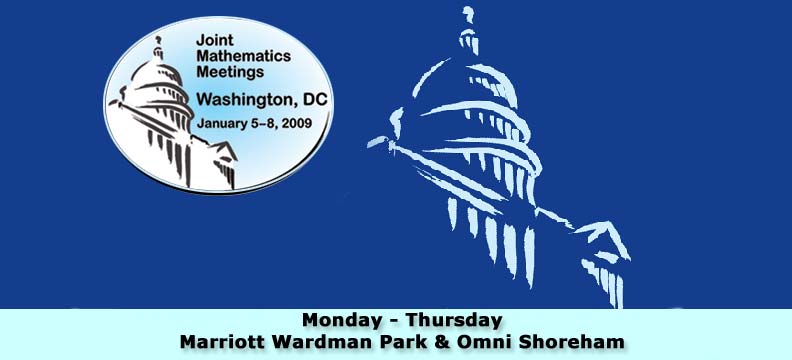For locations, click here;
All locations are subject to change
Because of the untimely death of Oded Schramm,
the Gibbs Lecture will be given by Percy A. Deift,
Courant Institute, on Integrable systems: A modern view,
at 8:30 p.m. on Monday.
Committee
on the Profession Panel Discussion, Tuesday, 2:30
p.m. to 4:00 p.m., What I Wish I Had Known or Studied
Before Going to Graduate School, moderated by Craig
L. Huneke, University of Kansas. A panel of current
graduate students, new Ph.D.s, and a recent graduate student
advisor consisting of Manoj Kummini, Purdue University;
Raegan Higgins, Texas Tech University; Aaron D.
Magid, University of Michigan; Marion Moore,
University of California Davis; Andrew Niedermaier,
University of California San Diego, and Roger A. Wiegand,
University of Nebraska-Lincoln, will discuss the graduate
school experience. This panel discussion is especially appropriate
for undergraduate students who are considering graduate
school in mathematics.
Grad School Fair,
Wednesday, 8:30 a.m. to 10:00 a.m. Here is the opportunity
for undergrads to meet representatives from mathematical
sciences graduate programs from universities all over the
country. January is a great time for juniors to learn more,
and college seniors may still be able to refine their search.
This is your chance for one-stop shopping in the graduate
school market. At last year's meeting about 300 students
met with representatives from 45 graduate programs. If your
school has a graduate program and you are interested in
participating, a table will be provided for your posters
and printed materials for US$50 (registration for this event
must be made by a person already registered for the JMM),
and you are welcome to personally speak to interested students.
Complimentary coffee will be served. Cosponsored by the
AMS and MAA.
Conversation on Nonacademic Employment,
Wednesday, 9:00 a.m. to 10:30 a.m. ( organized and moderated
by James G. Glimm, State University of New York,
Stony Brook, and Samuel M. Rankin III, AMS) Want
to find out more about jobs outside of academia? Come to
this informal question and answer session to talk with these
mathematicians about types of jobs, finding positions, the
interview process, work environments, and advancement opportunities
in government, business, and industry. Panelists include
Christina Bahl, National Security Agency; William
Browning, Applied Mathematics Inc.; Douglas Costa,
Susquehanna International Group; Eli Donkar, Social
Security Administration; Rebecca Wasyk, Metron Scientific
Solutions; and David Weinreich, U. S. Congress (professional
staff).
Who Wants to Be
a Mathematician, Wednesday, 10:00 a.m. to 10:55
a.m., organized by Michael A. Breen, AMS,
and William T. Butterworth, DePaul University.
Come watch eight of the area's top high school students
compete for cash and prizes by answering questions about
mathematics. You are invited to come and take part in this
educational and fun presentation.
Current Events Bulletin,
Wednesday, 1:00 p.m. to 6:00 p.m., organized by David
Eisenbud, University of California Berkeley. This
session follows the model of the Bourbaki Seminars in that
mathematicians with strong expository skills speak on work
not their own. Speakers in the Current Events Bulletin session
on Wednesday afternoon are Matthew J. Emerton, Northwestern
University; Olga V. Holtz and Michael L. Hutchings,
University of California Berkeley; and Frank Sottile,
Texas A&M University. Written versions of the talks
will be distributed at the meeting and also be available
on line at www.ams.org/ams/current-events-bulletin.html
after the conclusion of the meeting.
Committee on Science Policy Panel
Discussion, Wednesday, 2:30 p.m. to 4:00 p.m.,
Future Federal Science and Technology Budgets. Kei
Koizumi, American Association for the Advancement of
Science, will outline the latest news on this topic as seen
from his position as Director of the R&D Budget and
Policy Program for the AAAS.
Wolfgang Doeblin--A Mathematician
Rediscovered, Wednesday, 7:00 p.m. to 8:30 p.m.
This documentary film by Agnes Handwerk and Harrie Willems
tells the moving story of a young Jewish mathematician who
is tragically caught in the difficult times of World War
II. During the winter of 1939-40, while serving in the French
army, he wrote a mathematics manuscript entitled "On Kolmogorov's
equation". He sealed and sent this to the Academy of Sciences
in Paris. Later that winter, when trapped by German soldiers,
he committed suicide. The sealed letter was not opened until
May 2000; when deciphered, the manuscript showed that Doeblin
developed a formula to calculate the role of chance in continuous
random processes comparable to the formula that Kiyoshi
Ito developed some years later. The film explores the biography
of Wolfgang Doeblin, the intriguing history of his sealed
letter with the manuscript, and the mathematics in the manuscript.
Congressional Fellowship Session, Wednesday,
4:30 p.m. to 6:30 p.m., organized by Samuel M. Rankin
III, AMS. This session will describe the AMS Congressional
Fellowship, administered by the American Association for
the Advancement of Science (AAAS), and the fellowship's
unique public policy learning experience. This fellowship
demonstrates the value of science-government interaction
by allowing the fellows to bring a technical background
and external perspective to the decision-making process
in Congress. Previous and current AMS-sponsored Congressional
Fellows will give their perspectives on the fellowship to
interested meeting participants in an effort to encourage
applications for future fellowships.
The Future of School Mathematics Education,
Thursday, Thursday, 8:30 a.m. to 10:00 a.m., organized and
moderated by William G. McCallum, University of Arizona,
with panelists Scott J. Baldridge, Louisiana State
University; Daniel Chazan, University of Maryland;
Solomon A. Garfunkel, COMAP; and Kristin Umland,
University of New Mexico. Two recent conferences in the
fall of 2008 addressed the issue of improving school mathematics
education. One of these, about the future of high school
mathematics, was cosponsored by the University of Maryland’s
Center for Mathematics Education and Math is More and one,
in response to the National Mathematics Advisory Panel reports,
was cosponsored by CBMS and the U.S. Department of Education.
The four panelists, two from each conference, will relate
the results of those conferences and discuss the different
directions we can and should take. Sponsored by the Committee
on Education.
TOP
OF PAGE

